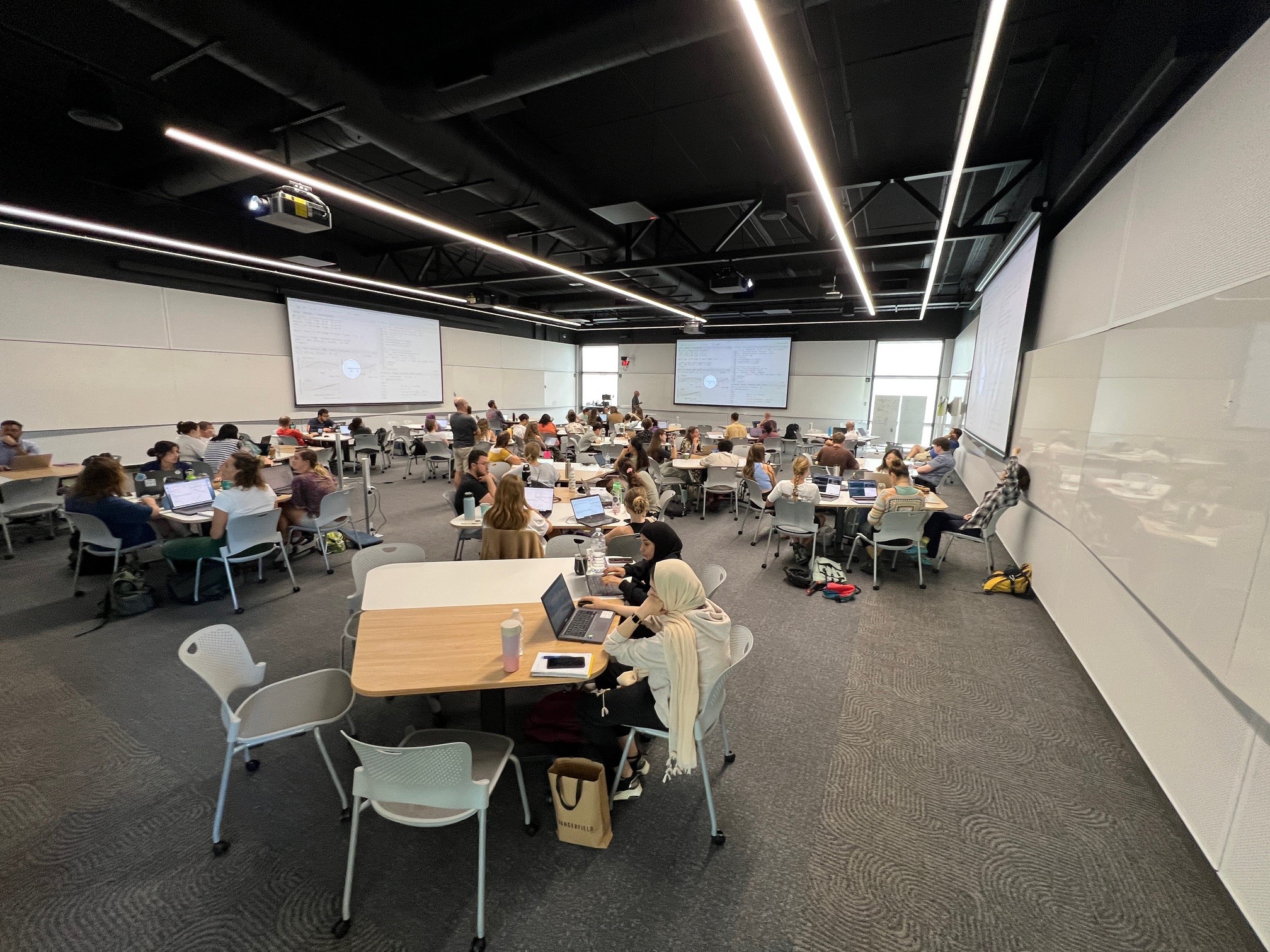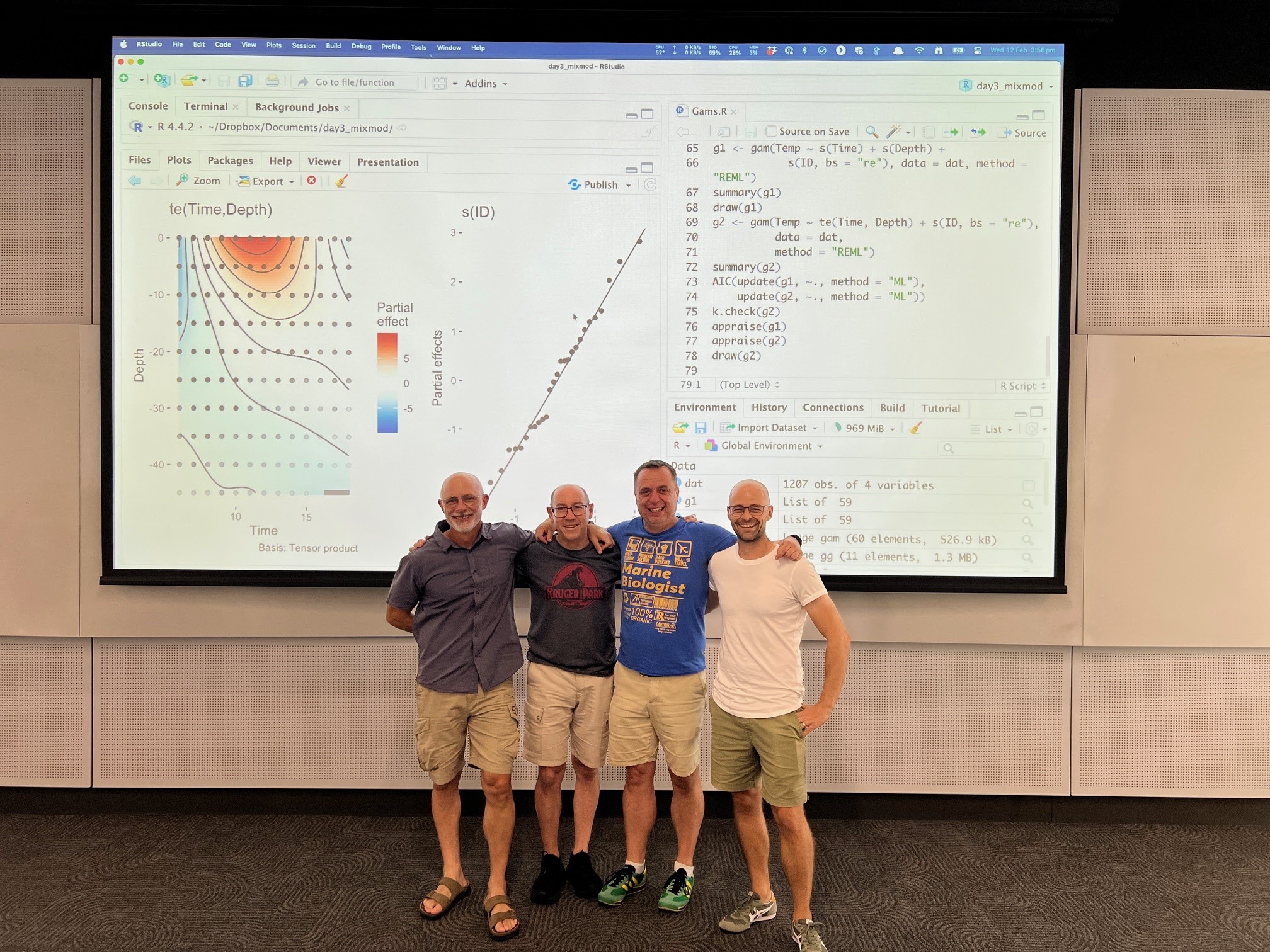CBCS has just successfully hosted a series of workshops teaching participants valuable skills in using the R programming language. The February R workshops were held over five days (10-14 February) and saw over 130 participants of different experience levels from academia, government and industry. In this workshop series, the team focused on statistical modelling techniques and how they can be correctly applied in R, featuring topics such as linear modelling, mixed modelling, spatial modelling and multivariate statistics.
The teaching team comprises CBCSers Professor Anthony Richardson and Dr Jason Everett, Professor David Schoeman from the University of the Sunshine Coast, and Dr Nicholas Clark from the School of Veterinary Sciences at UQ. While each instructor has different fields of research specialisation, all are passionate and self-taught experts who wish to pass on what they have learnt to the next generation of R programmers and applied statisticians. “Over the years, we have taught R to over 1500 people. It is especially rewarding to have many return to our new workshops to continue developing their R skills”, Professor Anthony Richardson says.
One of those 1500 people was Dr Jason Everett who attended the workshops in the early days. “As a biological oceanographer, I tended to program in MATLAB but Anthony encouraged me to learn R for statistical modelling. As its capabilities in data wrangling and spatial science have increased over the last decade, I have found myself working almost exclusively in R. I love that it is open source, and the community is so friendly and collaborative”, Jason says.

Photo credit: Dr Christina N Zdenek
“Who wouldn’t want to teach R?”
“I love teaching R because it’s an incredibly efficient way of upskilling emerging scientists: we can talk about the scientific method, statistical theory, programming approaches, ethics and communication at the same time and within the same context”, Professor David Schoeman shares. “And as we teach, we learn – not only through revising the content we present, but also from workshop participants as they ask questions or share ideas. Better still, as new R users improve their skills, they, in turn, become nodes around whom new users can cluster and learn. Best of all, in a world of acceleration and transience, the ability to solve problems step-by-step, and to communicate and store that process in code both is fun and satisfying. Who wouldn’t want to teach R?”
While the teaching team has conducted a series of annual R workshops since 2012, this year has many firsts. They have welcomed Dr Nicholas Clark to the team, bringing his expertise in developing computational tools and adapting techniques from epidemiology and statistical forecasting to study how organisms and ecosystems respond to environmental change. “I made many mistakes along my journey as a self-taught programmer, so I know how important it is to develop good coding principles early on. These workshops are a fantastic resource for people to learn these principles in a welcoming environment. I was thrilled to join the team this year and look forward to contributing more in the future”, Nicholas says.
This is also the first time that the R workshops have teamed up with CBCS. CBCS Director Associate Professor Daniel Dunn is an enthusiastic supporter of the partnership. “CBCS is super excited to be hosting the R workshops. We’re looking forward to continuing to foster this partnership as well as developing workshops around other topics useful for conservation in the future. These current and future workshops hosted by CBCS would be a great way to reach out to a diverse suite of communities interested in conservation”.
Dr Christina Zdenek, one of the many participants of the recently concluded February R workshops, shares her thoughts. “The CBCS R workshop was incredibly helpful. This five-day workshop is well-organised, run by well-established modellers, and attended by people from a range of sectors. The notes provided ahead of time for participants are extensive, relatively easy to follow, and a super resource post-course to refer back to when in the depths of data decision making and coding. The instructors' notes they provided also paired seamlessly with the R project and code, which is a mammoth task”, she says. “[The workshops] allowed me to conveniently pick and choose the days based on my research project's needs, and it's a great feeling to have that deeper breadth of understanding regarding what model to choose for your dataset, how to test the robust quality (or wider applicability) of the model, and why all these choices matter.”

Photo credit: Dr Christina N Zdenek
July series R workshop series in planning
This year is also the first year that there will be two series of workshops. While the recent February workshops focused on statistical modelling, the July workshops will have a different emphasis. “We recognised a growing demand for R workshops tackling topics beyond statistics. In response, we are introducing exciting and valuable new content covering both foundational and emerging topics, including data wrangling, open data science, writing functions, building R packages, and developing Shiny applications”, Anthony says.
Jason is particularly excited about the opportunity to expand the workshops’ reach and to focus more on programming skills. “If you are keen to write faster, clearer and more powerful code for your data analysis, then these are the workshops for you”.
Visit the official R workshops website (made using R!) to learn more about the July workshops.
